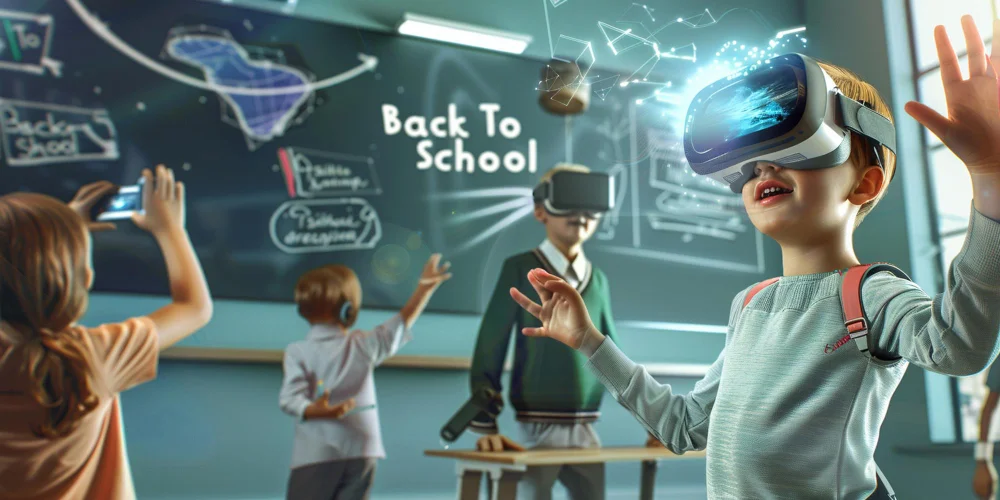Progress is something that the United Arab Emirates (UAE) has always been ready to embrace through advanced technology. From the sky-high development of futuristic architecture to the governance of states powered by AI, the outburst of innovation has always been a source.
Now, as the world leans into immersive tech, the UAE is yet again spearheading another revolution—integrating Virtual Reality in UAE Education and corporate training programs. It’s not all about glamour; it’s about changing how students learn, professionals are trained, and industries grow.
So let us now see what changes VR is making in the teaching-learning situations and workplaces across the Emirates.
The Reason for Using Virtual Reality? Immersive Learning 101
Picture a history class where students do not read about ancient civilizations but actually walk through them. A medical trainee, on the other hand, practices intricate surgeries, all without endangering a single life.
This is the matching of virtual reality in UAE education, which converts abstract concepts into concrete, interactive experiences. VR for education is expected to grow by 30% every year on a global level, and the UAE is not lagging behind but rather setting the pace.
With Dubai’s tech-inspired vision supported by programs like the National Innovation Strategy, the Emirates has become a fertile land for VR classrooms in Dubai and beyond. In fact, schools, universities, and corporations are treading on this road of VR to bridge gaps between theory and practice, which makes learning entertaining, effective, and accessible.
From Classrooms to Corporate Hubs: VR’s Dual Impact
1. Revolutionizing Education with VR Classrooms in Dubai
Dubai’s schools are no strangers to innovation. Institutions like GEMS Modern Academy and Dubai Future Foundation have already integrated VR classrooms in Dubai to create dynamic learning environments. For instance, biology students explore 3D models of the human heart, while geography classes “visit” the Sahara Desert or Antarctica—all without leaving their seats.
The benefits are undeniable:
- Engagement: Passive learning fades as students interact with content.
- Retention: Studies show VR improves knowledge retention by up to 75%.
- Inclusivity: Students with learning differences thrive in customizable VR settings.
According to a teacher from Dubai: VR is not a replacement for teachers. It’s aimed at aiding teachers in doing the things that are, at least, at one time, unfathomable.
2. Elevating Skills Through VR Training in Corporate
UAE is now also conducting VR training to empower the workforce outside of the school. Industries like aviation, healthcare, and construction use VR simulation for the safe and cost-effective training of employees. Some prominent instances include:
- Emirates Aviation University runs VR training modules to simulate cockpit emergencies.
- The Dubai Health Authority puts surgeons through training on a VR platform to minimize risks during actual surgeries.
What has the ROI been? The companies tell us that their onboarding is now faster, training costs are down, and workplace accidents are fewer. Ahmed Al-Mansoori, a Dubai-based HR manager, shares: “VR training is not a luxury today; it has become a demand-driven commodity to become competitive.”
The UAE’s Edge: Why VR Adoption Thrives Here
The UAE’s success with VR isn’t accidental. It’s the result of visionary policies and infrastructure:
- Government Backing: Programs like the Dubai 10X Initiative prioritize tech integration in education.
- Tech-Savvy Population: With 99% internet penetration, UAE residents adapt quickly to digital tools.
- Industry Collaboration: Partnerships between schools, tech firms, and policymakers ensure scalable solutions.
VR classrooms in Dubai are also breaking language barriers. Apps like Talespin offer multilingual VR content, aligning with the UAE’s multicultural ethos.
Challenges & The Road Ahead
While VR’s potential is immense, challenges remain. High setup costs and resistance to change can slow adoption. However, the UAE is tackling these hurdles head-on:
- Cost Solutions: Schools are partnering with tech providers for affordable VR kits.
- Teacher Training: Workshops ensure educators confidently use VR tools.
- Content Localization: Developers are creating culturally relevant VR modules for Arab students.
The goal? To make Virtual Reality in UAE Education accessible to every student, regardless of background.
Conclusion:
In the UAE, VR is not only a way of getting ahead; it is a path to reimagining what education and training can do. From a student traveling to the pyramids in a VR classroom in Dubai to engineers learning to operate the machinery in VR training, immersive tech has never been better at unlocking human potential.
If you are an institution or business intending to join the revolution, this is the time. Limina Studios, based in Dubai, specializes in creating tailored VR training and classroom solutions to suit the unique needs of the UAE. With their help, you are not just adopting another technology; you are investing in a secure, intelligent, and engaging future.



 Virtual Tour
Virtual Tour CGI Virtual Tour
CGI Virtual Tour Photography & Video
Photography & Video Virtual Reality
Virtual Reality Virtual Commerce
Virtual Commerce Indoor Navigation
Indoor Navigation Analytics
Analytics Avatars
Avatars Ticketing System
Ticketing System Connected Workforce
Connected Workforce Facilities Management
Facilities Management Real Estate & Architecture
Real Estate & Architecture Hospitality and Travel
Hospitality and Travel Museum and Galleries
Museum and Galleries Retail and Showrooms
Retail and Showrooms Industry 4.0
Industry 4.0 Education
Education Oil & Gas
Oil & Gas Blog
Blog Case Studies
Case Studies About us
About us Partners
Partners


















